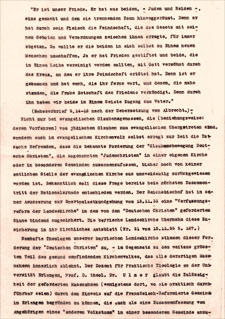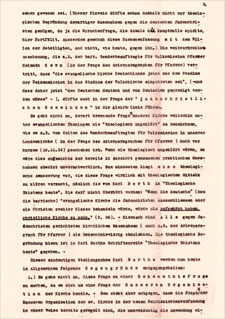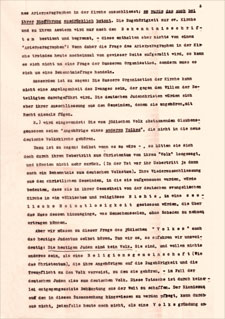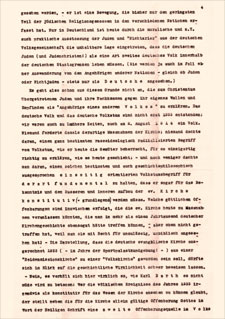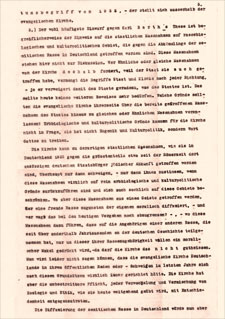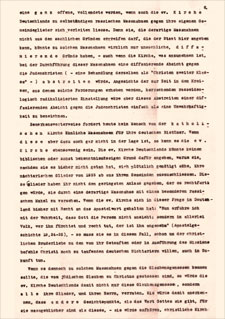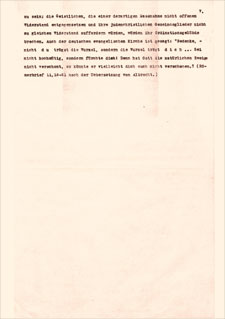Karl-Heinz Becker: No Racial Hatred in the Church
After the so-called Sportpalast scandal of the German Christians on November 13, 1933, the Bavarian Clergy Association called upon its members to meet the threat to the church’s confession by renewing their ordination vows and by swearing obedience to Regional Bishop Hans Meiser (1881–1956). The Franconian pastor Karl-Heinz Becker (1900–1968) felt this was too little. He demanded that violations of the confession clearly be acknowledged as such and repudiated. His demand was chiefly aimed at the application of the so-called Aryan paragraph in the ecclesiastical sphere.
Becker tried on November 17, 1933 to win over the regional bishop’s special representative for home mission, Pastor Helmut Kern (1892–1941), as an ally in order to get his request accepted by Regional Bishop Meiser. Concretely, his intention was to move Meiser to demand the revocation of “non-Aryan” pastors’ retirements as contrary to the Confessions and to support the cause of pastors in Berlin, who had been removed from their offices for criticizing the Aryan paragraph. He additionally wanted Meiser to call attention to the contradiction between the party’s profession of belief in so-called positive Christianity in its platform and its use of Alfred Rosenberg’s “Myth of the 20th Century” (1893–1946) in its schooling.
Kern, however, responded to Becker with procedural and substantive concerns. Open to völkisch thought, Kern explained placatingly that the Aryan paragraph was not a relevant confessional issue on which the regional bishop had to express an opinion. Citing Karl Barth (1886–1968), Becker, on the other hand, insisted that the validity of baptism and ordination was not subject to any biological reservations arising from prevailing circumstances. Kern only managed to counter Barth’s arguments with a mixture of anti-intellectualism, national sentiment and Lutheran polemic against a Reformed Christian.
Following his correspondence with Kern, Becker summarized his opinion of Nazi racial policy and its penetration of the church in his book “Judenchristliche Gemeinden?” (Jewish Christian Congregations?) in early 1934. His book constituted a strongly ethically oriented examination of Nazi racial policy and the German Protestant churches’ conduct (A. Töllner, Frage, 88).
Becker opened by criticizing that the German Christians’ demand for special Jewish Christian congregations – although they were not desired by the populace – had not yet met with the necessary opposition in the church and had even garnered votes of approval in the Bavarian regional church. He additionally made mention of a statement of Friedrich Ulmer’s (1877–1946), a theology professor at the university in Erlangen, as well as his correspondence with Kern. Making reference to Karl Barth and the Reich Church constitution, Becker stressed that the introduction of the Aryan paragraph in the ecclesiastical sphere affected not only external issues of the church’s organization but also its confession itself.
With not entirely logical arguments, Becker further stressed that baptized Jews were members of the German nation and no longer of the Jewish nation. He expounded the problems of even talking about a “Jewish Nation” and additionally asserted that present-day Jews were not a nation but rather a religious community. Excluding these people from the national community in Germany would put them in the untenable position of more or less having to live as a second German nation within the borders of the German state.
Becker also pointed out that corresponding demands were not being imposed on the Catholic Church. Anticipating the theses of the Theological Declaration of Barmen, he asserted that the establishment of Jewish Christian parishes would constitute a betrayal of the Lord of the church and evidence that the church held other points of view in higher esteem than the Word of God. Any pastor that did not put up any resistance against such plans would be breaking his ordination vows.
Source / title
- © Landeskirchliches Archiv Nürnberg, Pers. LVIII, Nr. 16

